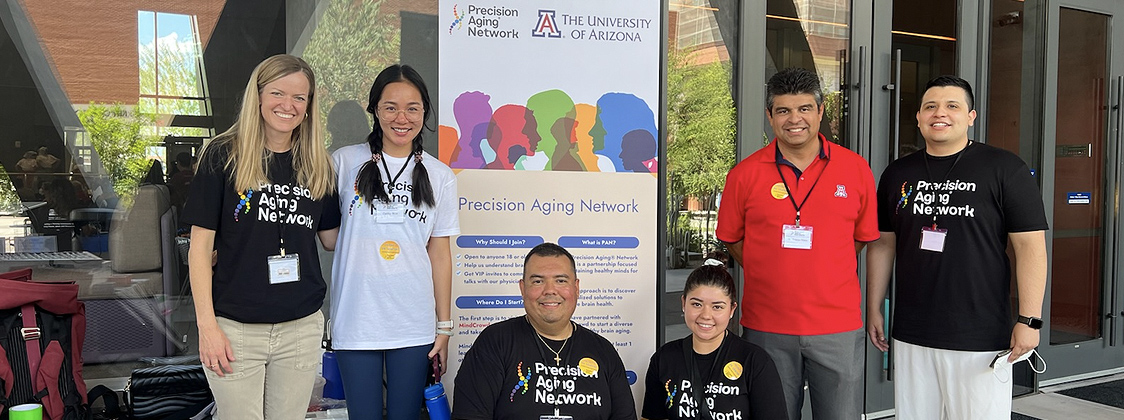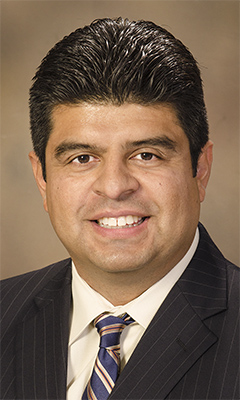Professor Powered by Passion for Chronic Disease Prevention in Hispanic Communities

Guided by his Mexican-American family heritage, Dr. Tomas Nuño (red shirt) found a passion for chronic disease prevention in Hispanic communities and now works on many public health research projects that benefit the people of Arizona and communities along the US-Mexico border.
For Tomas Nuño, PhD, MA, the path to his current position as an assistant research professor in the Mel and Enid Zuckerman College of Public Health (MEZCOPH) started with his family and his community. Nuño grew up bilingual in Fresno, California. His father was born and raised in Guadalajara, Jalisco, Mexico, his mother was born and raised in Fresno, and her parents were from the Mexican states of Zacatecas and Michoacan, so he grew up with strong ties to Mexican heritage and culture.
“I remember strong cultural traditions of family meals, social events, sports, and church,” says Nuño, “I grew up speaking Spanish to my dad’s side of the family and English to my mom’s side of the family. I grew up playing soccer since the age of seven and watching my dad play soccer at the park on Sundays.”
Nuño came to the University of Arizona to earn his Master of Arts degree in Economics. It was here that he met his mentor, and now good friend, Dr. Francisco Garcia, through a summer job. Dr. Garcia previously served as chief medical officer for Pima County Health Department and currently serves as a deputy county administrator for Pima County. He encouraged Nuño to apply to the PhD program in epidemiology at MEZCOPH, a decision that changed the course of his life. Nuño also credits Dr. Robin Harris as a dedicated mentor as he was pursuing his doctoral degree.
“I often think how completely different my life would have been if I had not followed the path to public health. The roles I play today professionally and personally derive from that decision,” says Nuño, “Working to make a difference in community health and people's lives are what truly motivates me. I love the applied nature of public health and epidemiology.“
Dr. Nuño is currently a co-investigator on University of Arizona Prevention Research Center (PRC) projects, on the National Institutes of Health (NIH)-funded Precision Aging Network, and Co-Lead for Engagement for the All of Us Research Program in Arizona.
In his current projects, he is focused on working with and for communities. Nuño uses his skillsets in epidemiology, evaluation, and community-based research alongside his Spanish language and cultural fluency to help increase racial and ethnic minority participation in research. He sees that diverse participation in research will result in studies that benefit all communities, especially when the research is part of precision medicine initiatives.
“Chronic disease prevention is my passion,” says Nuño, “If we can prevent diseases before they occur, before they become severe, the difference in the quality of life for both individuals and families is tremendous. I am especially passionate about this in the Hispanic communities where I work.”
Dr. Nuño is particularly proud of the work he did with Dr. Cecilia Rosales on a project entitled, “Tools and Practices to Decrease CVD and Complications in the Diabetic Population of Mexico.” The project was funded by a National Heart Lung and Blood Institute (NHLBI) R01 grant and supplemental grant, and it was conducted in collaboration with binational colleagues at El Colegio de Sonora in Hermosillo, Sonora, Mexico. Based on decades of research on community health workers and border health at the Arizona Prevention Research Center, the behavioral intervention Meta Salud Diabetes (MSD) was developed and tested in Mexico, with results published in the International Journal of Epidemiology in 2021.
“This project was instrumental in focusing me on the path of chronic disease prevention, social and behavioral epidemiology, and binational health,” says Nuño, “I feel strongly that MSD can make a significant impact among the Hispanic population in the United States, and I am in the process of pursuing grant funding to expand that effort.”
Dr. Nuño credits Dr. Rosales as an instrumental mentor who helped to launch his junior faculty career. He also has a great appreciation for the PRC team and the binational team on the MSD project, including Maia Ingram, Jill de Zapien, Ada Wilkinson-Lee, Scott Carvajal, Elsa Cornejo, and Catalina Denman who have been his close colleagues for the past six years. “They are good people who are dedicated to improving lives in Hispanic communities along the US-Mexico border and in both countries,” says Nuño. With the same feelings of appreciation, Nuño’s colleagues all praise his passion, dedication, and collaborative spirit.

Tomas Nuño, PhD, MA
Dr. Nuño completed his PhD in Epidemiology at MEZCOPH in August 2011 and was then awarded a postdoctoral research fellowship with the Arizona Area Health Education Center-funded Clinical Outcomes and Comparative Effectiveness Research Academic Fellowship Program. The goal of the fellowship program was to provide training in clinical outcomes and comparative effectiveness research, with a specific focus on primary care for rural and underserved patients, families, and communities in Arizona. Subsequently, in September 2012, Dr. Nuño received a three-year National Cancer Institute Center to Reduce Cancer Health Disparities postdoctoral fellowship grant as part of the University of Arizona Cancer Center R25T Cancer Prevention and Control Translational Research Training Program.
In September 2017, Dr. Nuño received a three-year junior faculty administrative supplement to a previously funded R01 grant from the National Heart, Lung, and Blood Institute to explore tools and practices to decrease cardiovascular disease (CVD) and complications among Hispanic diabetics in Arizona.
While he was working on his doctorate degree, Nuño met his wife, Dr. Velia Leybas Nuño, who is now interim assistant dean for diversity, equity, and inclusion in MEZCOPH. They have two daughters, and he feels the challenge of chronic disease prevention in his roles as a husband and father. “I may not always get it right, but I try, the effort is there to live and to learn, to do my best to lead a healthy life,” says Nuño, “As my father often said when I was growing up – sound body, sound mind, and sound spirit.”
“Tomás has a passion for helping others and he’s a talented researcher,” says Dr. Iman Hakim, dean of the Zuckerman College of Public Health, “we are grateful to have him in our MEZCOPH community, and grateful for all he has done to help our Hispanic communities in Arizona, and on both sides of the US-Mexico border, especially to prevent chronic disease.”
In addition to his research projects, Nuño strives to educate and guide the next generation of public health professionals. “I am proud to be a Hispanic epidemiologist and represent the Department of Epidemiology and Biostatistics at MEZCOPH. I tell my student interns and employees about the importance of mentorship. One mentor can make all the difference in your life,” says Nuño.
“I encourage students to find their passion and work towards that. In my work, I often think ‘I can’t believe they pay me to do this’ and that is work we should all strive for and be blessed to have.”

